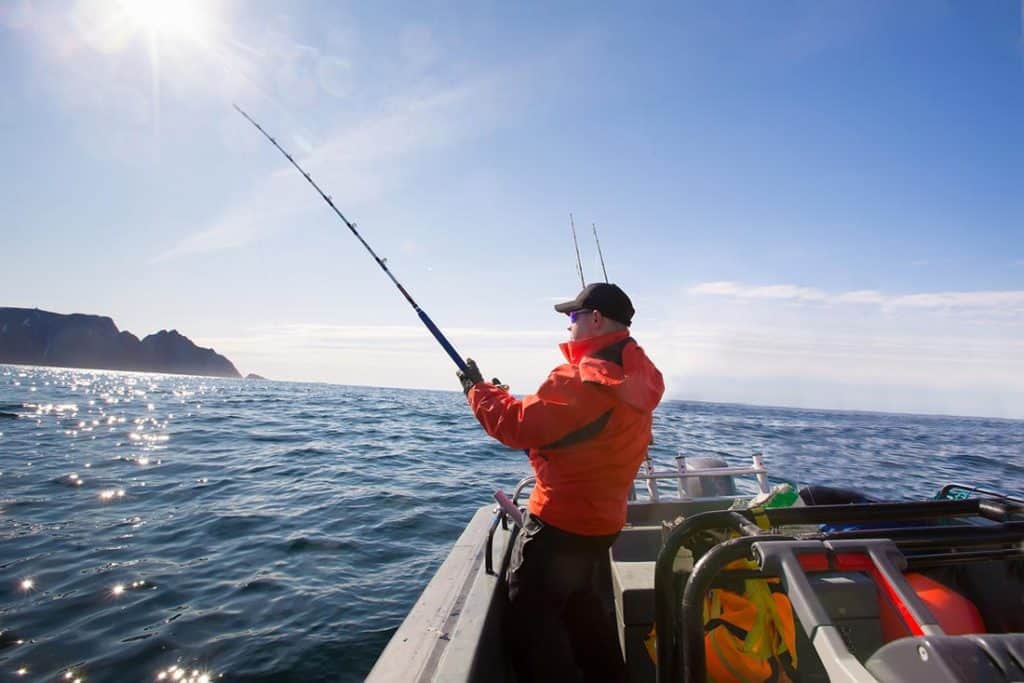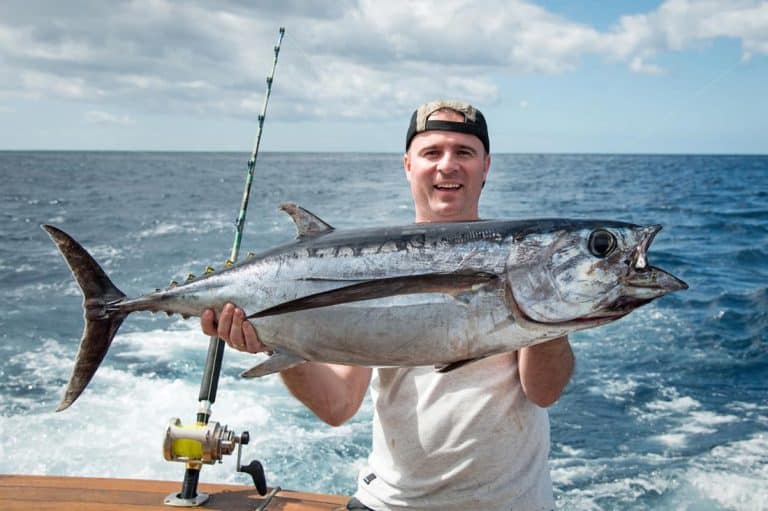Offshore fishing, also known as deep-sea fishing, is exciting and can be a good way to spend your day. Given the water’s calming effect, it is an excellent way to enjoy the ocean and the beautiful scenery.
Offshore fishing involves tackling deep sea waters, typically more than nine miles from shore. It means that fishing offshore doesn’t just require you a boat but also adequate knowledge to make your experience worthwhile. On that note, here are some tips for an enjoyable offshore fishing experience:
Get The Right Gear for OffShore Fishing

The first order of business is to gear up appropriately. Unlike on-shore fishing, where all you need is your hook line and a hat, you must be in your fishing gear before getting on your boat for safety purposes.
Remember, you’ll be miles away from the shores, so you should be in the right fishing gear. This includes:
- Polarized sunglasses: It helps you see through the deep water. This way, you can spot your prey quickly.
- Rain Gear: It helps keep you dry.
- Windbreaker: It comes in handy when the temperature gets chilly.
- Sunscreen: It protects your skin against sun rays.
On the other hand, you need to have the right fishing equipment. Choosing your fishing equipment depends on the type of fish you intend to catch. It also should match your fishing technique. As such, you need the following:
- Fishing rod and reels
- Tackle
- Line
- sinkers
Understanding your fishing equipment is imperative if you’re going for the deep sea. You’d also want to bring an excellent bait to lure your prey.
Always remember to use a buoy bridle. It helps in anchoring your boat, facilitating a smooth offshore fishing experience. Most fishermen trust their bouy bridle to align their boat with the waves to effectively attract their bait.
Polish Your Fishing Techniques
Fishing entails using the right tools, fishing at the right time, and being subtle in your spree. Take advantage of technological advancements in fishing equipment. You have a better shot at catching fish. For instance, you can use fish locators to identify your target quickly.
As such, you need to polish your fishing skills, or else you’ll hardly have any catch. For this reason, you should understand the behavioral patterns of the fish. You can use either natural or artificial bait, whichever you find more effective.
It’s also necessary to check in with the regulations of the land to ensure your bait is accepted in such waters.
It is also best to wash your hands and clean your bait of unusual tastes and smells because fishes have a good sense of smell. The last thing you’d want is to alert them of your presence in the water. They’ll hide and run away from you, and you won’t be able to haul them in. These fishing techniques come in handy and make your experience worthwhile.
Choose The Right Boat
As mentioned, you’ll need a boat for offshore fishing. Therefore, choosing the right type of boat is essential. Firstly, you’ll need a spacious boat that has enough room to accommodate your supplies and equipment. Secondly, you should pick a stable boat. Deep waters are often rough. So, a stable boat can help you sail the rough water smoothly.
On the same note, you need to understand the different fishing boats and their qualities. These include:
- Center consoles: These are appropriate for deep-sea fishing because of their basic design. They’re tough to beat, hence suitable for offshore fishing.
- Bass boats: These are highly evolved machines, making them useful when fishing in rough waters.
- All-purpose fishing boats: These are flexible for all kinds of fishing.
- Crossover boats: These have offshore fishing capabilities. They also have accommodations, which means you can go fishing for a whole night.
Choosing the right boat can never be overlooked. Go for a boat that has the capabilities to withstand the open sea fishing challenges.
Charter Your First Trip
If it’s your first deep-sea fishing, it’d be best to charter it. It’s one of the most effective ways to start your offshore fishing experience. Remember, experience is the best teacher. With chartered offshore fishing, you get to learn from the best.
Skilled fishermen can guide and teach you the ropes of deep-sea fishing. For instance, they can teach you how to avoid accidents by keeping your lines neatly coiled. These safety skills can help improve your fishing experience while in the water.
Chartering your offshore fishing trip allows you to interact with experienced fishermen so they can enlighten you on how to find perfect spots. This way, your next fishing trip can be fast and safer. Chartering your first offshore fishing goes a long way towards honing your experience and skills.
Observe The Weather
It’s necessary to observe the weather before going into the sea. It has a significant impact on the experience. It is already dangerous to try the deep sea, let alone go during extreme weather conditions.
If there’s a storm coming, you should get out of the water. Strong wind currents and waves can swerve your boat. If you don’t have a high-speed and stable boat, there are high chances you’ll not survive the currents.
It is best to check the weather in advance. Note that the weather often changes once you hit the deep seas, so always be prepared for bad weather. For your safety, you can observe it for a day or two before getting on your boat. Also, bring your safety kit for any emergencies.
Weather can also influence the behavior of the fish. With calm waters, fish move to the deeper edges. They’ll also stay where food is abundant. Therefore, research such factors to make the most of your fishing trip.
Follow Safety Guidelines
Given the circumstances of fishing in the deep water, your safety should come first. Remember, you’ll be miles away from the land and out of sight. This makes it essential to follow offshore safety guidelines. In case of an accident, you can easily be helped. Here are some offshore fishing safety guidelines you should adhere to:
- Have boat safety equipment such as a life jacket, torch, radio, and maps
- Service your motors before your trip
- Inspect waterfronts
- Fish in permitted areas
- If your area is an ice zone, avoid fishing on icy days
- Cover your fishing knives when not in use
The safety guidelines help prepare you for any emergencies. On the same note, understand your limits. Know how far your boat can go and turn around when you get to the extreme. Also, know your boat’s capacity to avoid overloading it. You also need to approximate the weight of your prey. This way, you’ll be certain your boat can safely transport you to the harbor.
Additionally, you’re not the only predator. Some fish can harm or even feed on you. Thus, it’s essential to familiarize yourself with the water and look out for impending danger.
Know Your Prey
Knowing what species you’ll be hunting helps you decide the fishing equipment you’ll use and the best application method. Most fish have unique characteristics and require some skills to fish. A good example is bass sea fishing.
It’s one of the toughest fish to catch. Therefore, if it’s present in the water, you need to understand its weight and escape tactics to make a catch.
Once you spot your prey, you’ll need to go for it. Besides being fast, you should hit the fish at the right spot to immobilize it and prevent it from swimming away. Again, it’d be sad to injure the fish and then have it escape your catch. You’ll have alerted the fish that there’s danger. This makes it worse for your hunting experience.
Additionally, there are rules on the species to hunt. You can face hefty penalties if you’re found fishing the wrong species. Thus, understand the kind of fish you’d expect to spot in deep seas and the right species to hunt.
Get Fishing Permits
As indicated earlier, it’s essential to keep up with fishing regulations. Some states require you to have a fishing permit or license. You need to be fully trained for you to get the permit. The training includes proper handling of equipment that ensures you’ll be responsible and avoid self-harm. It also covers safety rules and other regulations.
The first step to take is to enroll in courses to enhance your skills and knowledge of the right fishing techniques.
Again, some states prohibit commercial fishing or fishing for sport. If certain species are getting extinct, you can be prohibited from fishing them. Hence, issuing permits and licenses helps regulate this matter. When applying for a permit, carefully specify your reason for fishing. Otherwise, the law will soon catch up with you if you throw caution to the wind.
Additionally, there is an age requirement to get a fishing permit. With offshore fishing, you can’t leave anything to chance. Sometimes accidents occur, and the best you can do is swim toward the shores. With the rough waters, children can easily drown. To avoid this, governments have an age requirement on who can and can’t get into the water. Be sure to be of the right age before applying for a fishing permit.
Other essential requirements for fishing permits include the following:
- Valid identity card or passport
- Renewal of the permit after some time
- Payment of some annual fee
- Certificate to own some fishing equipment such as a speargun
If you fulfill such requirements, you can be allowed to go fishing. Check with your local authorities on the requirements to fulfill to get the fishing permit.
Carry Some Snacks
Offshore fishing takes longer than inshore fishing. It also involves early mornings or late evenings. Again, you’ll be ineffective on an empty stomach. You can bring snacks to the boat to munch on as you go fishing. However, avoid smelly snacks to avoid being detected by your prey. So, if you intend to bring some snacks to your fishing quest, go for snacks with less scent.
You should also bring some water to quench your thirst. If you’re fishing during the day, there are high chances you’ll get dehydrated. So, it is best to bring a water bottle from home. Bring plenty of water that can take care of the whole crew.
Bring An Extra Set Of Clothes
You might wet your while fishing clothes. You sometimes have to jump into the water, and you can’t properly function when you are damped. It’d be best if you carried another set of clothes. Once you’re done fishing, you can change immediately.
Conclusion
Offshore fishing is one of the most exciting water activities. However, you have to make safety your priority. As you plan to go fishing, it’s essential to familiarize yourself with the safety precautions and observe offshore fishing guidelines.
Have the right gear and polish your fishing techniques. Research the type of fish that are common in the water where you intend to fish and ensure you’re on the right side of the law. Most importantly, consider the weather, as it can significantly impact the success of your adventure. Use the tips suggested above to make your offshore experience memorable.
Also read Best Hiking Shirts For Women.
